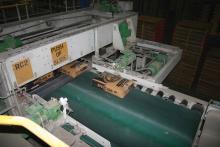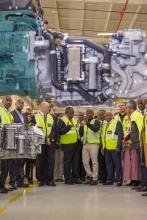PPC, the South African building materials giant, has continued to show its commitment to improving the lives of all South Africans, most recently through its participation in the recent Growing Up Africa Mandela Day Challenge.
Speaking ahead of Mandela Day, an annual international day in honour of former South African president Nelson Mandela, celebrated each year on 18 July, Mandela's birthday, Kabira Akoob, PPC’s corporate social investment (CSI) manager, discussed the company’s plans to further contribute towards building social cohesion in the communities in which it operates. One such initiative is seeing PPC work with Growing Up Africa, a non-governmental organisation (NGO), who are managing the building of a R40 million (US$3.06mn) 2,100m² education campus situated on a 7,000m² site in Devland, Soweto.
Through such initiatives, PPC aims to deliver lasting benefits to local communities by supporting mutually beneficial partnerships that contribute to social and economic development - creating long-lasting solutions to shared challenges.
“Our partnership with Growing Up Africa, began late last year when we donated R150 000 ($11,510) towards the campus building and we are proud to now be amongst the 136 companies, to have contributed materials and community labour funding, towards this initiative,” explained Akoob.
As part of the recent PPC Mandela Day Challenge, staff members, including the PPC executive team, filled 1,000 sand bags which were used to fill the cavity walls of the Devland campus building. In keeping with the 67 minutes for Mandela theme, PPC donated R67 ($5.14) for every bag filled on the day. As an added layer to its contribution efforts to raise more funds, the company challenged other project partners to match or beat this donation towards the community labour cost to complete the construction of the project.
“Since 2001, we have gradually redefined our social investment projects to focus more on enhanced community partnerships, environmental stewardship and employee involvement. As a responsible corporate citizen, we are committed to supporting causes and initiatives that contribute to measurable, meaningful and impactful benefit to the communities we serve,” said Akoob.
“Success in corporate social investment is measured differently from success in business or government,” says Deborah Terhune, founder and director of Growing Up Africa. “We ultimately measure the success of our projects by the degree to which they expand access to the fundamental human right to social justice, economic empowerment and a healthy sustainable environment.”
Terhune added that changing the way people live, both globally and locally, through multi-disciplinary rigour and with compassion for humankind, has inspired the partnership between PPC and Growing Up Africa in one of the most ambitious humanitarian projects being built in South Africa today.
Each year, PPC invests in excess of R10 million ($767,500) in community development initiatives aimed at empowering marginalised groups through upliftment and partnership programmes. PPC’s Corporate Social Investment in South Africa include, amongst others, Learner Focus Week and Mobile Science Labs.
“Building on our rich 125-year legacy, we remain committed to creating value for the company and our stakeholders. With this in mind, our CSI philosophy is designed across pillars of community infrastructure investment, regional socio-economic development and education - each aimed at benefitting South Africa and the rest of our African markets” Akoob concludes.










